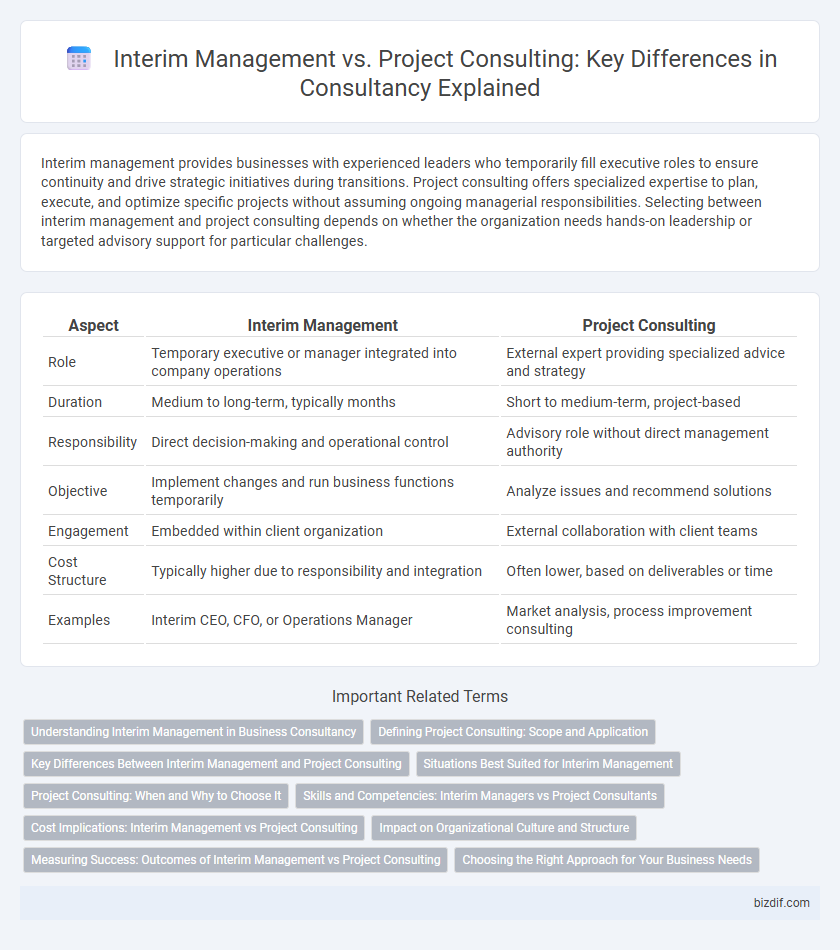Interim management provides businesses with experienced leaders who temporarily fill executive roles to ensure continuity and drive strategic initiatives during transitions. Project consulting offers specialized expertise to plan, execute, and optimize specific projects without assuming ongoing managerial responsibilities. Selecting between interim management and project consulting depends on whether the organization needs hands-on leadership or targeted advisory support for particular challenges.
Table of Comparison
| Aspect | Interim Management | Project Consulting |
|---|---|---|
| Role | Temporary executive or manager integrated into company operations | External expert providing specialized advice and strategy |
| Duration | Medium to long-term, typically months | Short to medium-term, project-based |
| Responsibility | Direct decision-making and operational control | Advisory role without direct management authority |
| Objective | Implement changes and run business functions temporarily | Analyze issues and recommend solutions |
| Engagement | Embedded within client organization | External collaboration with client teams |
| Cost Structure | Typically higher due to responsibility and integration | Often lower, based on deliverables or time |
| Examples | Interim CEO, CFO, or Operations Manager | Market analysis, process improvement consulting |
Understanding Interim Management in Business Consultancy
Interim management involves placing experienced executives in temporary leadership roles to address urgent business challenges, drive change, or fill critical gaps during transitions. This approach provides hands-on decision-making authority and accountability, contrasting with project consulting which primarily offers strategic advice and recommendations without direct management responsibility. Interim managers embed within the client organization, ensuring swift implementation and operational continuity while navigating complex business environments.
Defining Project Consulting: Scope and Application
Project consulting involves providing expert advice and actionable strategies tailored to specific projects within an organization, focusing on optimizing processes, resource allocation, and risk management to achieve defined objectives. Its scope typically includes project planning, execution oversight, performance assessment, and ensuring alignment with business goals, applicable across a wide range of industries and project types. Unlike interim management, project consulting does not entail taking on operational roles but remains advisory, supporting decision-making and project success through specialized knowledge and analysis.
Key Differences Between Interim Management and Project Consulting
Interim management involves temporarily embedding experienced leaders within an organization to handle ongoing operations, drive transformative change, and fill executive gaps, whereas project consulting focuses on providing specialized expertise and advisory services for specific projects or challenges. Key differences include the interim manager's hands-on decision-making authority and operational responsibility, contrasting with consultants' advisory role and limited implementation duties. Interim managers integrate into company culture and manage resources full-time, while consultants typically engage in short-term, task-specific interventions without direct control over daily functions.
Situations Best Suited for Interim Management
Interim management is best suited for organizations facing urgent leadership gaps, complex change initiatives, or critical business transformations requiring immediate, hands-on expertise. It excels in situations demanding rapid decision-making and operational continuity where long-term strategic input must be combined with practical execution. Unlike project consulting, interim managers embed within the company to lead teams directly, ensuring accountability and swift results during transitional periods.
Project Consulting: When and Why to Choose It
Project consulting is ideal when businesses require specialized expertise to address specific challenges, implement new technologies, or guide strategic initiatives within a fixed timeframe. Unlike interim management that temporarily fills leadership roles, project consulting delivers targeted solutions through expert analysis, planning, and execution without ongoing operational responsibilities. Organizations should choose project consulting to achieve measurable outcomes, optimize project success, and leverage industry-specific knowledge for critical projects.
Skills and Competencies: Interim Managers vs Project Consultants
Interim managers bring extensive leadership experience and operational expertise to manage change and drive business continuity during transitional periods. Project consultants specialize in analytical skills, strategic planning, and problem-solving to deliver specific project outcomes within defined scopes. Both roles require strong communication and stakeholder management, but interim managers often navigate broader organizational challenges, while project consultants focus on technical or advisory competencies.
Cost Implications: Interim Management vs Project Consulting
Interim management typically involves higher daily rates due to the seniority and full-time commitment of experienced executives, leading to increased short-term costs but potentially faster issue resolution. Project consulting offers more predictable expenses through fixed-fee or hourly billing structures, allowing organizations to budget precisely for specific deliverables or phases. Cost implications must consider the duration, scope, and complexity of requirements, with interim management favoring ongoing leadership needs and project consulting suited for targeted, time-bound interventions.
Impact on Organizational Culture and Structure
Interim management embeds leadership within an organization temporarily, directly shaping culture and structure through decision-making and active management, leading to immediate and tangible changes in organizational dynamics. Project consulting offers specialized expertise to influence culture and structure indirectly by recommending strategic initiatives without permanent shifts in leadership. The contrasting approaches determine the depth and speed of cultural adaptation and structural transformation within the company.
Measuring Success: Outcomes of Interim Management vs Project Consulting
Measuring success in interim management centers on achieving operational continuity and leadership stability, often quantified through performance metrics such as reduced downtime and improved team productivity during transitional periods. Project consulting success is typically evaluated by the timely delivery of project milestones, budget adherence, and the fulfillment of specific project objectives, emphasizing efficiency and scope completion. Both approaches require clear KPIs aligned with organizational goals, but interim management focuses on sustained impact while project consulting targets discrete, outcome-driven results.
Choosing the Right Approach for Your Business Needs
Interim management provides experienced executives to lead and stabilize your company during critical transitions, offering hands-on leadership and decision-making authority. Project consulting focuses on delivering specialized expertise and strategic advice for specific initiatives, enabling targeted problem-solving without assuming operational control. Selecting the right approach depends on your business's urgency for leadership presence, scope of change, and need for long-term versus short-term intervention.
Interim Management vs Project Consulting Infographic

 bizdif.com
bizdif.com